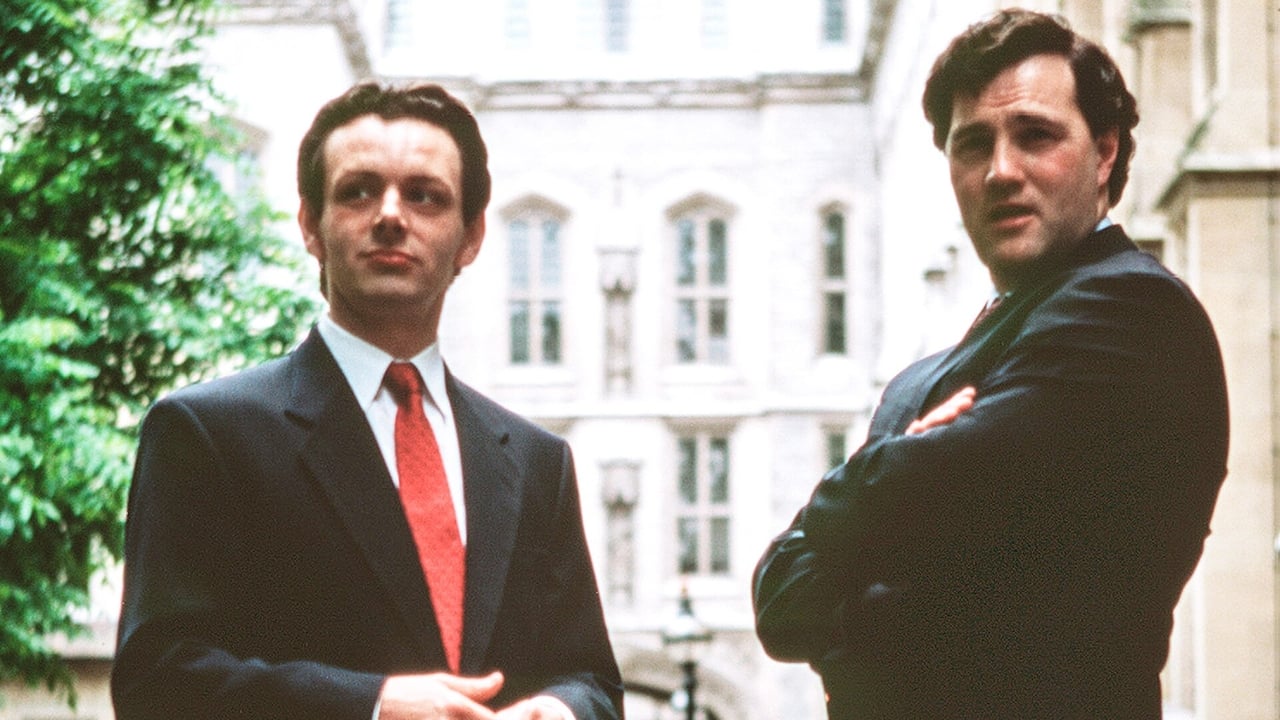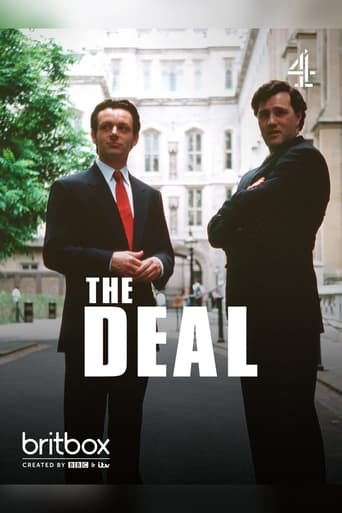

Stephen Frears has done some excellent movies documenting recent British social and political history. In this particular movie, he gives us the background to Tony Blair's ascendancy to the leadership of the British Labour Party. After getting a seat in Parliament in 1983, Tony Blair, performed by Michael Sheen, was very much a junior to the formidable Scot named Gordon Brown, a longtime member of the party, played by David Morrissey. We see Blair looking for office space after his election and sharing a room with Brown as the two become friends during the Thatcher era. Brown is an intellectual with a thick Scottish accent and brooding manner. He does his homework and gives a rousing first speech. Tony Blair takes himself and his work much less seriously and seems very much a lightweight but his easy manner and likability pay dividends down the road. I enjoyed David Morrissey in the Gordon Brown role and got an appreciation for the difficult spot he found himself in when he eventually succeeded Blair as leader in 2007. Michael Sheen is a competent actor, playing Blair in The Queen and The Special Relationship and also David Frost when he faced Richard Nixon in a series of interviews. The movie is also interwoven with actual film clips from the era of Thatcher, and Labour Leaders Neil Kinnock and Michael Foote. We see how Brown, for all his apparent ambition, seems to hold back when opportunity knocks while the less goal driven Tony Blair eventually sails toward the leadership by force of personality and good luck. This movie was made before Tony Blair stepped down as prime minister and we know Gordon Brown was defeated in 2010 without ever winning an election on his own. Life can be unfair but Tony Blair did in his final years, face difficult times and left office discredited by the war in Iraq. His personal popularity has never recovered. Two great politicians are contrasted here and the movie sheds great light on their personal friendship and rivalry.
... View MoreIt's 1994. Tony Blair (Michael Sheen) does a deal with Gordon Brown (David Morrissey) for the leadership of the Labour Party. Twelve years earlier, both Blair and Brown are new members after a Conservative landslide forced to share an office. The bombastic Brown rises quickly in the opposition ranks. The more personable Blair is slower but is Brown's confidant and close political ally. After a close but heartbreaking election in '92, Blair pushes Brown to run for the leadership but is rebuffed. Blair becomes more ambitious. Brown makes enemies in the party while Blair makes gains in popularity.It's a fine docudrama about a couple of fascinating personalities. Both Sheen and Morrissey are well cast and great actors. It hits on the main points of history but it doesn't give the history life. Director Stephen Frears needs more personal moments between the two leads. The most compelling scenes are when Blair badgers Brown about his personal life and later when they start competing. This is a fine history. I wish Frears could dig deeper into the personalities and allow this to be even more Shakespearian.
... View MoreIt is approaching an election in the UK when the leader of the Labour party, John Smith, suffers another in a line of heart attacks and dies. With the leadership campaign about to start the clear choice appears to be Gordon Brown, a stanch Scotsman. However Tony Blair is also beginning to appear more likely as he will appeal to Southern voters who would be turned off by Brown. Blair rings Brown to arrange a meeting to discuss which will go for the job. The film flashbacks to the start of their relationship, sharing an office in Westminster on their first seats.I have recently seen a BBC political drama (The Project) which was focused around the rise (and perversion) of Labour - it lasted 4 hours and was unlikely to win over anyone who wasn't already suitably informed about the topic. The Deal, on the other hand, is 90 minutes long and is a punchy little summary of the supposed deal brokered between Blair and Brown to prevent them having to battle for the party leadership in the wake of John Smith's death. This is worthwhile as it is likely to attract those not actually into politics but just looking for a reasonable drama to pass the time.As such it moves along quite well. It covers lot of ground quite quickly and will give those lacking the knowledge (like me) a good understanding of the political landscape of the time. It also has a certain amount of drama - some of which is real and some of which is provided by characters and sinister direction. The one flaw I did feel it had was that it was a drama and not a documentary, to that end dialogue has been created and scenes are the combination of sources and records. This is still good but it has the effect that we can't take everything at face value - I would have preferred if more sources were clearly defined and the facts more clearly established. The fact that the whole film is a drama means that I couldn't be sure how much of the film (or how little) was actually artistic license.The cast are good. The better role is Morrissey as Brown. He manages to get his mannerisms right without letting it turn into a impression, he plays him as a dour character (which Brown pleaded innocence of the next day on the BBC, despite claiming not to have seen the film) which is the image many have of him, but he does bring him to life well. Sheen's Blair is also good but is more of a mimic than a real character - it hard to describe but it felt like he had spent more time focusing on the mannerisms than the character , although, that said, he did bring another layer out at some points (witness his face change as Brown leaves the restaurant at the end). Rhys' Mandelson is too much of an effort to be sinister and didn't work for me - the Mandelson that we have seen is more lively and overt than this, he does have his sinister side but the fact that it is in this colourful shell makes it more interesting, that wasn't brought out. The support cast is good but this is a two-hander and the two characters carry it well - even if the restaurant scene is not exactly the equal of Heat!Overall this works well as a political drama which will reach those not normally reached by this type of material. However the fact that the facts were mixed with dramatised and fictional scenes was a problem for me and I wasn't totally sure what bits were real and what bits were interpreted. Still an enjoyable film nonetheless.
... View MoreIn some ways, the story of Gordon Brown and Tony Blair is profoundly uninteresting. Two men with a similar political philosophy consider challenging for the leadership of the party, eventually decide not to compete with one another but subsequently (in events not covered by this film) fall out. Of course, there are many "what ifs", but politics is full of these. The absence of a philosophical clash, or a deep personal emnity, makes their deal in some senses trivial - one guy stood aside for the other, so what? If any other job than that of potential Prime Minister had been at stake, would anyone care? Because of that job, their decision clearly had some significance. But politicians make deals all the time with one another - and had we not a media obsessed with political minutiae, that history might well have been forgotten. According to the briefings, it certainly hasn't been forgotten by Brown - but that doesn't necessarily make it important.Stephen Frears' film tries hard to reconstruct these events, but it fails to really gain life, telling us what we know already without really adding anything new. David Morrissey, as Brown, is less convincing than when given free rein to play a fictional politician as he did recently in 'State of Play'; Michael Sheen, as Blair, is always just a little bit more callow and hollow than the real thing. The story suggests there was little real friendship between the two, which reduces the tale to a series of empty manoeverings. And while it's fun to see representations of various political characters, we get too little sense of their whole lives. There are a few nice touches (Blair's instinctive family values, Brown's genuine grief at John Smith's death) but 'The Deal' still feels like a compilation of yesterday's newspapers. History will certainly remember both men, but their deal will surely rate only a footnote. For good or ill, Blair stood and won - and that's all we really need to know.
... View More